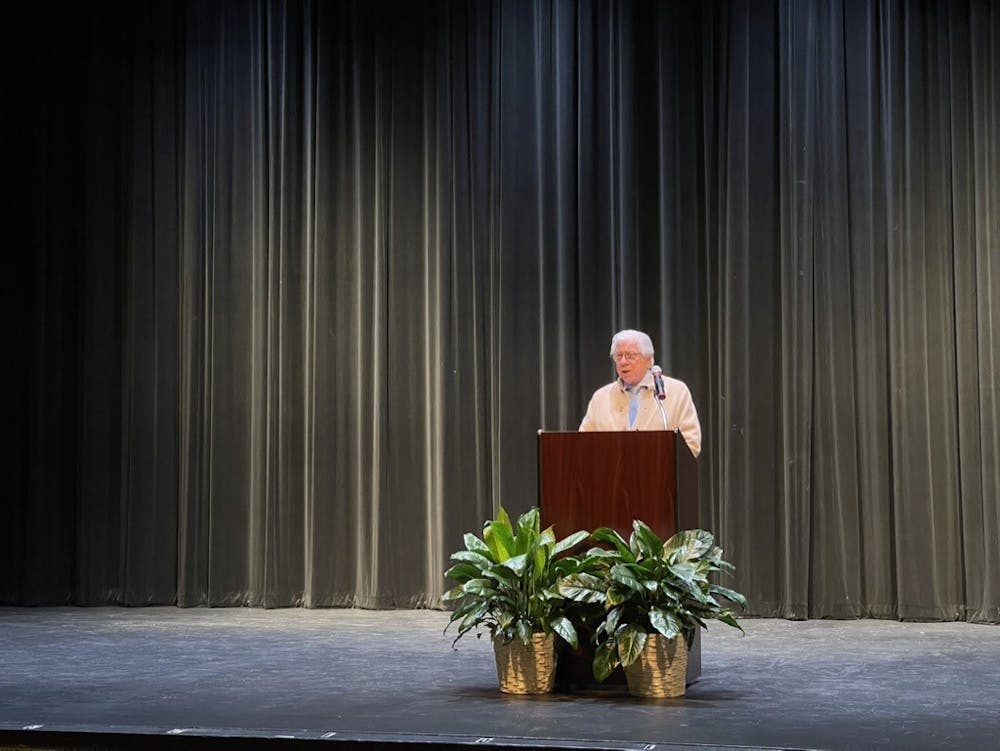Carl Bernstein, journalist and author, spoke on Miami Hamilton’s campus to give advice to those wary of the current war in Ukraine, its effects on America and the similarities between the Nixon Watergate scandal and the Trump White House.
Bernstein’s lecture, the second in-person event of the Michael J. Cooligan History Project, spanned his decades-long career in journalism and his advice for the future of reporting.
As a D.C. native, Bernstein has been in the newsroom since age 16 at The Washington Evening Star as a copyboy. Since then, he has worked for The Washington Post, where he famously reported on the Watergate scandal and co-authored “All The President’s Men,” the book that resulted in President Richard Nixon’s resignation.
Now, Bernstein works as a political analyst for CNN. His new book, “Chasing History: A Kid in the Newsroom,” is told through the voice of his younger self as he worked his first job, his first beats in the realm of journalism, all before reporting on Watergate.
After reflecting on his decades-long career, he shared his view on the failures of modern journalism and how we must reevaluate “what is news.”
“Press exists for the public good,” Bernstein said.
He later partially blamed a lack of thorough coverage on the Russian 2014 invasion of Crimea as a stepping stone for the current Ukrainian invasion, what Bernstein calls the “rape of Ukraine.”
After the lecture, Bernstein held an extended question-and-answer period, citing the current geopolitical climate as reason to give the audience a chance to ask more than usual.
Audience members asked Bernstein for his take on solving the Ukrainian crisis, his reflection on his 1992 piece, “The Idiot Culture” and what future journalists can do to combat the change in atmosphere industry-wide.
To this, Bernstein reiterated, we must find “the best obtainable version of the truth.”
Matthew Smith, Miami regional director of public programming, spoke about the importance of events like Bernstein’s lecture for the public good.
“I think it's good as a public university that we have these programs where people from diverse backgrounds and political beliefs are presented with well-reasoned opinion and perspective,” Smith said.
Enjoy what you're reading?
Signup for our newsletter
Event organizers estimated Parrish Theater to have had as many as 375 audience members.
“I liked his focus on accountability because we really need more ... in everything from politics to journalism to education,” said Kira Pierson, a fifth-year criminal justice major at Miami’s Hamilton campus.
However, not all audience members were as impressed with Bernstein’s insight.
“I don’t think he presented both sides of the equation,” Tom Reckner, Cincinnati resident, said. “My feeling is that [journalists] should present what is encountered and let the reader decide.”
Bernstein, throughout his lecture, highlighted the most important job of journalists is to decide which stories are news.
“I think that we are in an age, first of all, of selfie culture and the idea that everybody is going to find the pictures we take of ourselves interesting,” Bernstein said after his lecture.
Despite a lecture full of disparaging remarks against former President Donald Trump, Bernstein said, “Trump’s right, there’s too much fake news.”
Bernstein said some organizations like The Washington Post have managed to create high-quality digital journalism. Other franchise news organizations, though, he feels don’t put enough emphasis on reporting.
To aspiring journalists, Bernstein has one solution.
“What can we do? Keep reporting.”



